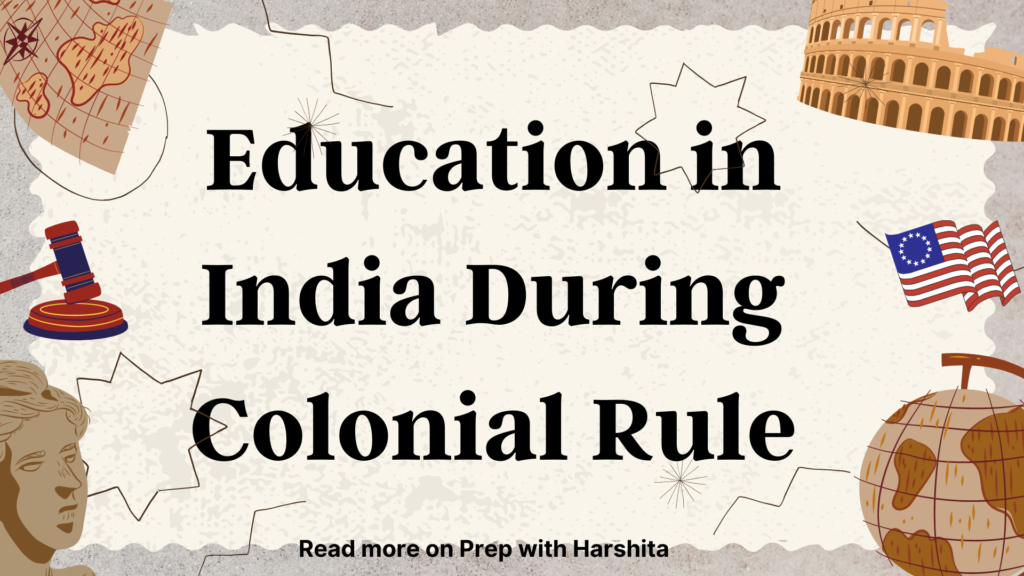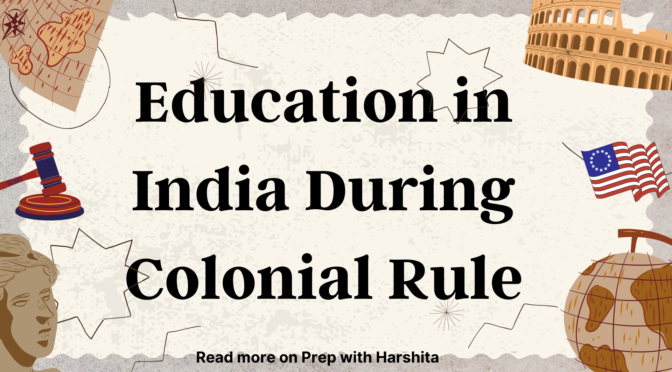During colonial rule in India, the education system underwent significant changes that had lasting effects on the country.
Here are the prominent characteristics of education in India during colonial rule in detail:
- Elitist and Limited Access: The education system under colonial rule was highly elitist, catering primarily to the elite and upper classes. British colonial authorities established prestigious institutions such as universities, colleges, and schools, which were accessible only to a small segment of the Indian population. These institutions provided Western-style education and aimed to produce a class of individuals who could serve as intermediaries between the British administration and the local population.
- Emphasis on Western Education: The British introduced a system of education heavily influenced by Western models. The curriculum emphasized subjects such as English, mathematics, sciences, and social sciences, while traditional Indian knowledge systems and languages were marginalized. The aim was to produce a class of Indians who were familiar with British culture, language, and administration, which would facilitate the functioning of the colonial administration.
- Limited Vernacular Education: While the British introduced English education, vernacular education in Indian languages was limited and received less support and funding. The emphasis on English education created a divide between the educated elite who had access to English and the majority of the population who were excluded from this form of education. This language-based disparity had long-lasting consequences for social mobility and economic opportunities.
- Role of Missionary and Private Institutions: Missionary schools played a significant role in the education system during colonial rule. Christian missionaries established numerous schools and colleges across India, often focusing on providing education to marginalized communities. These institutions, along with privately-run schools, contributed to the spread of Western education in the country. However, they also played a role in promoting Western cultural values and religious conversion.
- Neglect of Indigenous Education Systems: The colonial administration largely ignored and marginalized indigenous education systems that were prevalent in India before their arrival. Traditional Indian systems of learning, such as Gurukuls and Madrasas, faced neglect and were seen as inferior to the Western education model. This resulted in the erosion of traditional knowledge and cultural practices.
- Stratification and Social Divide: The education system under colonial rule reinforced social divisions and stratification. Education was accessible primarily to the upper castes and privileged classes, while marginalized communities and lower castes had limited or no access to formal education. This created disparities in opportunities, social mobility, and access to resources, perpetuating social inequalities.
- Limited Emphasis on Technical and Vocational Education: The colonial education system focused more on producing clerks, administrators, and professionals in fields such as law, medicine, and civil services, rather than providing technical and vocational education. This limited the development of skills and hindered the growth of industries and economic self-reliance.
Here are a few positive impacts of education during colonial rule in India:
- Introduction of Western Knowledge and Modern Sciences: One positive impact of colonial education was the introduction of Western knowledge and modern sciences. The British education system brought advancements in subjects such as mathematics, natural sciences, and social sciences. This exposure to modern knowledge contributed to intellectual development and broadened the horizons of Indian scholars and thinkers.
- Spread of English Language: The emphasis on English education had a lasting impact on India. English became an important language for administration, commerce, and communication. It facilitated access to global knowledge, literature, and ideas. English education also played a role in promoting social mobility, as it provided opportunities for Indians to pursue higher education, and professional careers, and interact with the British ruling class.
- Growth of Educational Institutions: Colonial rule led to the establishment of universities, colleges, and schools across India. Institutions such as the University of Calcutta, the University of Bombay, and the University of Madras were founded during this period. These institutions provided platforms for intellectual engagement, research, and the dissemination of knowledge. They contributed to the growth of scholarship and the development of academic disciplines in India.
- Role of Missionary Education: Missionary schools and colleges, though driven by religious motives, played a positive role in spreading education to marginalized communities and remote regions. They provided access to education for individuals who would not have had opportunities otherwise. Missionary education contributed to the spread of literacy, the promotion of girls’ education, and social upliftment in certain areas.
- The emergence of Nationalist Consciousness: Education played a crucial role in shaping the nationalist movement against colonial rule. Indian intellectuals who received Western education, such as Raja Ram Mohan Roy and Mahatma Gandhi, became advocates for social reform, political independence, and the rights of the Indian people. Education provided a platform for raising awareness, fostering critical thinking, and mobilizing the masses toward the struggle for independence.
- Legacy of Institutional Framework: Many educational institutions established during colonial rule continue to exist today and form the backbone of India’s education system. These institutions have evolved, adapted, and contributed to the growth of education in independent India. They serve as centers for research, learning, and academic excellence, providing opportunities for generations of students.
It is important to note that while there were positive impacts, the colonial education system also had limitations and negative consequences, such as the neglect of indigenous knowledge systems, the perpetuation of social divisions, and the limited access to education for marginalized communities.
Also Visit: Prep with Harshita

Also Read: Parenting Style


This article provides valuable insights into the impact of colonial rule on education in India. Understanding this history is essential for shaping modern educational policies. As we reflect on the past, aspiring students in Greater Noida can pursue quality education at top B.Tech and MBA colleges nearby for a promising future.
The British colonial period significantly shaped India’s education system, introducing Western-style learning while marginalizing indigenous knowledge. Education was largely elitist, benefiting a select few while leaving most of the population without access to formal learning.
Despite its limitations, colonial education introduced English, modern sciences, and structured institutions, which played a role in shaping India’s academic landscape. However, it also created a divide, limiting opportunities for many.
At DRS International School, we strive to bridge these gaps by offering a balanced curriculum that integrates global perspectives with Indian traditions, ensuring students gain a deep understanding of history while preparing for a dynamic future.
During colonial rule, education in India was designed to serve British interests, focusing on Western knowledge while neglecting traditional learning systems. This created an educational divide, limiting access to quality learning for the majority of Indians.
However, this period also led to the establishment of universities, the spread of English, and exposure to modern sciences. These developments, while not inclusive at the time, laid the groundwork for future academic advancements.
At Edify Schools, we take inspiration from history to create an inclusive, well-rounded education system that nurtures innovation, leadership, and critical thinking, ensuring students are prepared for both local and global challenges.
Colonial rule drastically altered India’s education system, prioritizing English-based learning over indigenous knowledge and restricting access to the privileged few. Traditional learning institutions like Gurukuls and Madrasas were largely ignored.
While this system helped introduce structured education, it also reinforced social inequalities. The knowledge imparted was designed to produce clerks and administrators rather than thinkers and innovators.
At Edify School Medchal, we believe in bridging the past and present, ensuring students receive a holistic education that combines modern learning with cultural values, helping them develop skills for a bright and impactful future.
Colonial education in India prioritized Western learning, sidelining traditional Indian knowledge and limiting access to only a small section of society. This approach created a gap that took years to bridge.
However, the introduction of structured schooling, English, and modern sciences also influenced India’s evolving education system. It laid the foundation for universities and formalized education as we see it today.
At DRS Kids, we blend modern educational techniques with cultural values, ensuring that children develop a strong foundation for learning in a fun and engaging environment, setting them up for future success.
this is unblocked agario games site. Thanks for your post
It was amasing post. Lets try to plau unblocked games
https://microsoft-powerpoint-2010.softonic.kr/download
https://nicesongtoyou.com/financial-portal/
전신스타킹
https://www.youtube.com/@GILMONG201
https://new-software.download/windows/scapture/
https://www.youtube.com/channel/UCeVNIN2PoYFRDmFyYRmK7bQ
https://mintfin.tistory.com/tag/미스터트롯20콘서트20일정
https://www.youtube.com/@TV신호등
https://new-software.download/windows/winrar/
https://www.youtube.com/channel/UCe0Qrv4HvRK_iup3X_cNdBA
https://www.youtube.com/@TV신호등
https://www.youtube.com/@trot-workshop
https://www.youngstarmedia.com/
https://www.youtube.com/@소중한인연-c1u
벼룩시장 구인구직 및 신문 그대로 보기 (PC/모바일) | 구인구직 앱 어플 무료 설치 다운로드 | 모바일 벼룩시장 보는 방법 | 벼룩시장 부동산 | 지역별 벼룩시장 | 벼룩시장 종이신문 에 대해 알아보겠습니다. 섹스카지노사이트
https://www.youtube.com/channel/UCyt2dGrKTf9KpBk1jdUl3oA
https://www.youtube.com/channel/UCeVNIN2PoYFRDmFyYRmK7bQ
https://www.youtube.com/@가요여행
https://www.youtube.com/channel/UCeVNIN2PoYFRDmFyYRmK7bQ
https://www.youtube.com/@가요여행
https://www.youtube.com/@소중한인연-c1u
https://www.youtube.com/@영스타미디어
https://www.youtube.com/channel/UCJLXoLNzHeK70WCJlQNYf-g
https://kleonet.com/entry/tag/꼬리에-꼬리를-무는-그날-이야기-133회/
https://www.youtube.com/@BIMONG
https://nicesongtoyou.com/tax/inheritance-tax/
https://www.youtube.com/@DaftTaengk
https://www.youtube.com/channel/UCyxM_MlJsJQaQSuJ8lR58tg